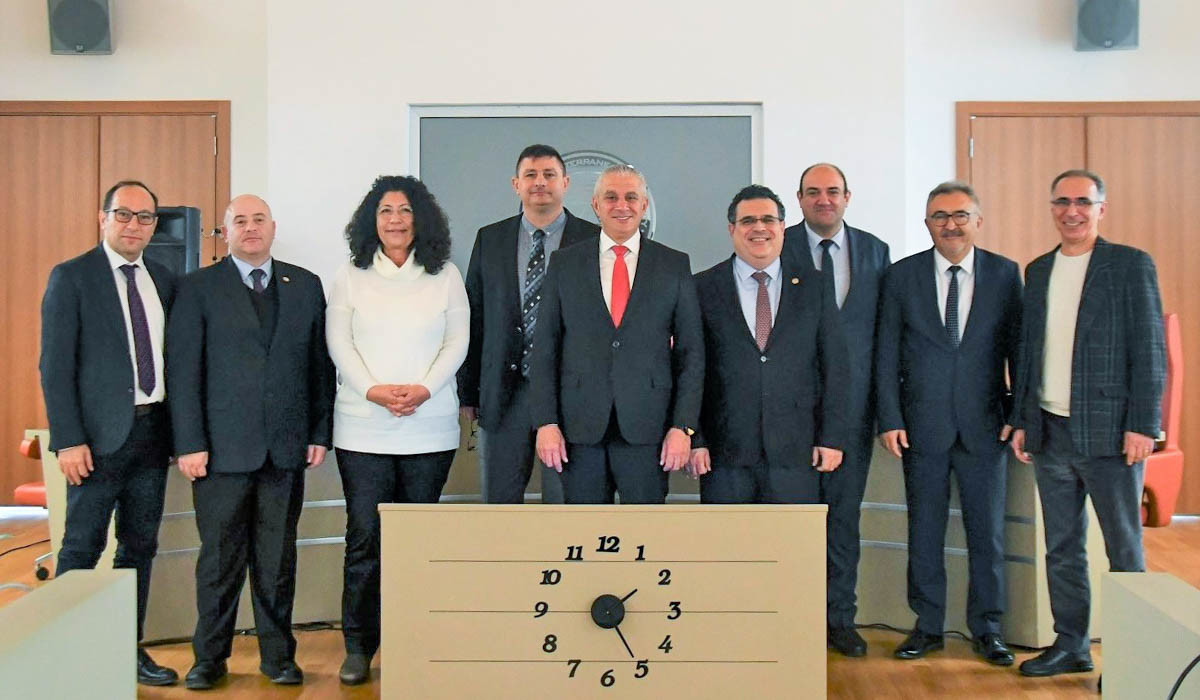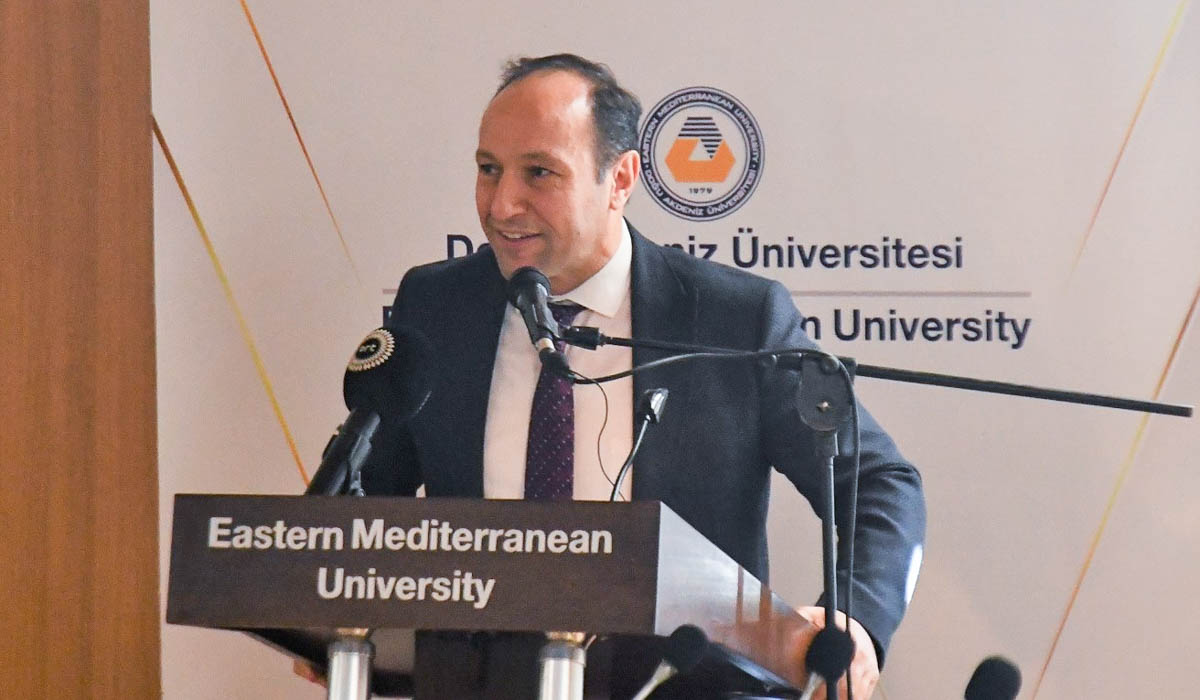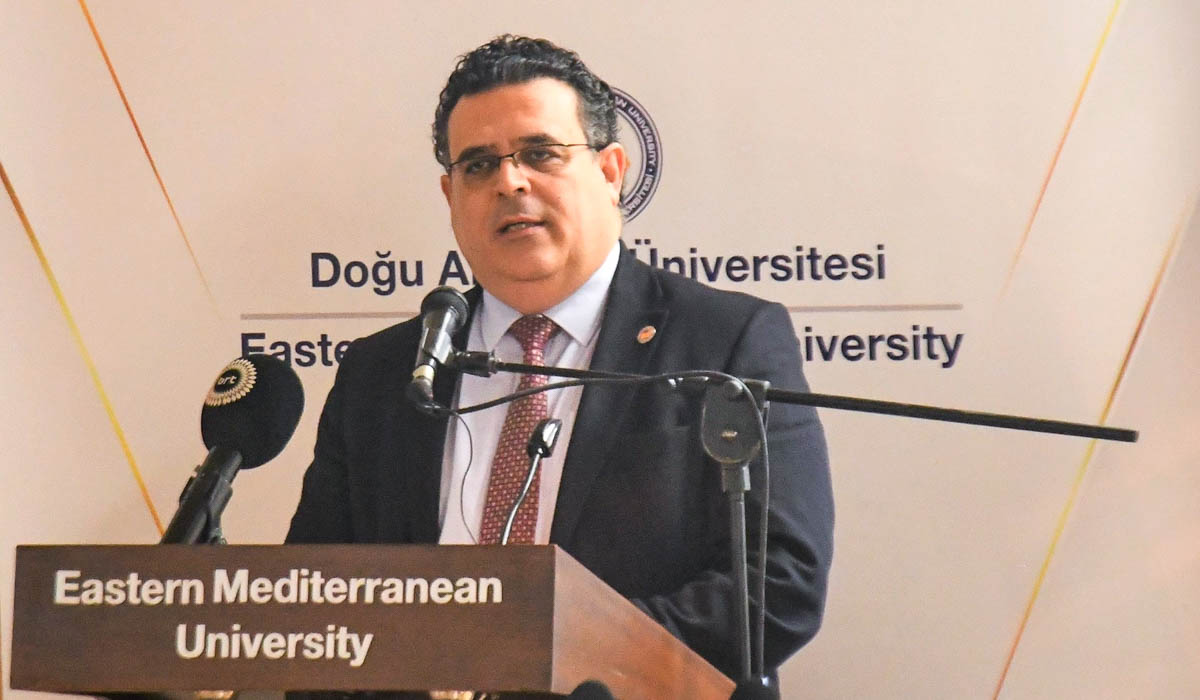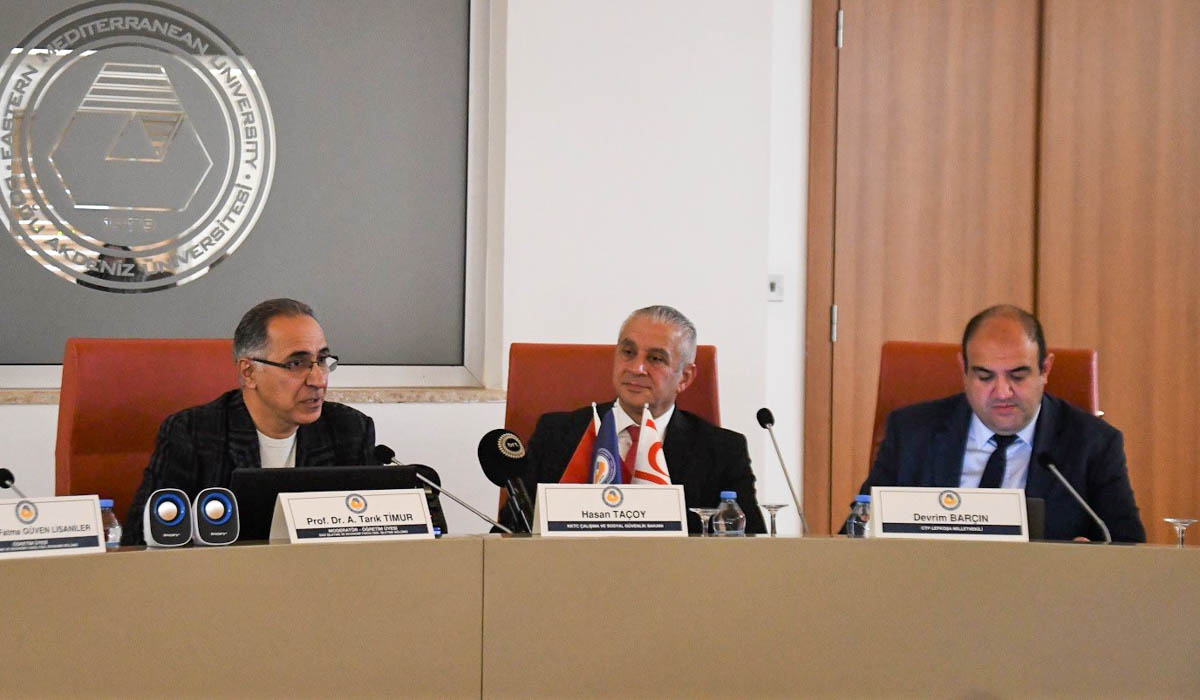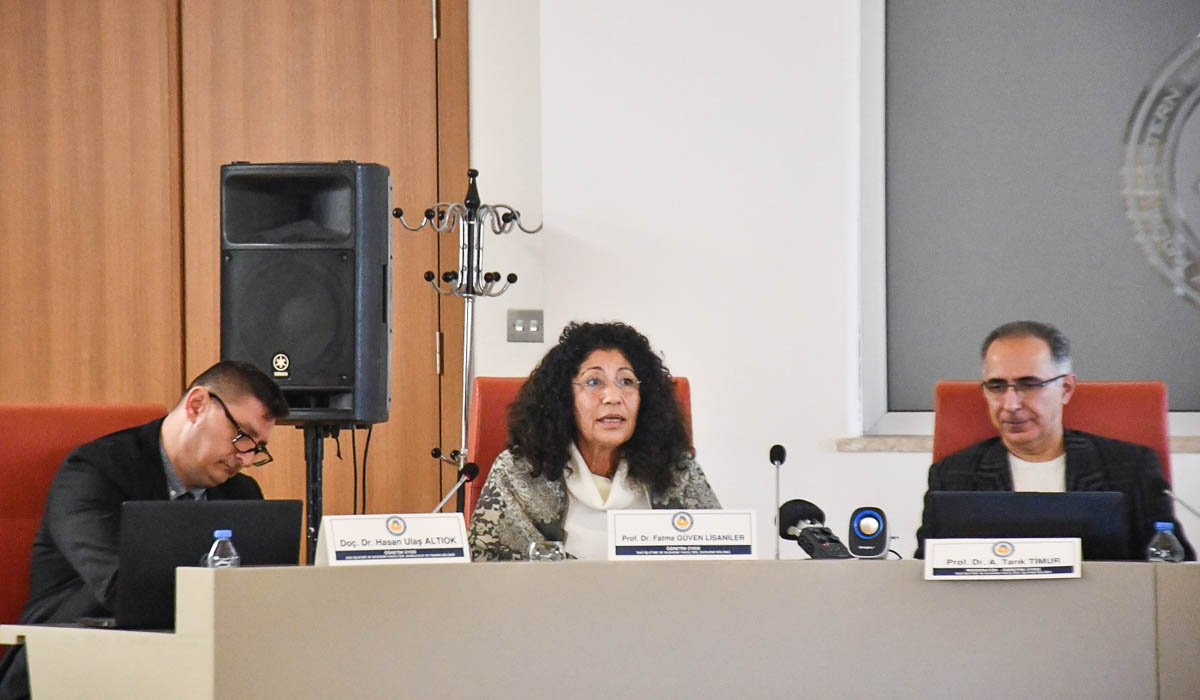The panel titled “TRNC Social Security System Structural Issues, Sustainability and Recommendations for Solutions” organized by the Eastern Mediterranean University (EMU) Business and Economics Faculty took place with the participation of Turkish Republic of Northern Cyprus (TRNC) Minister of Labor and Social Security Hasan Taçoy on Wednesday, 18 January 2023 at 10:00 at EMU Senate Meeting Hall. Members of the parliament Devrim Barçın, Erkut Şahali and Jale Refik Rogers, EMU Board of Trustees President Dr. Erdal Özcenk, EMU Rector Prof. Dr. Aykut Hocanın, EMU Board of Trustees member Ersun Kutup, faculty deans, academic personnel, administrative officials, local government representatives and the non-governmental organization representatives attended the event.
“Our Faculty Proposes Solutions for the Problems of the Country”
Delivering the opening speech of the panel, EMU Business and Economics Faculty Dean Prof. Dr. noted that as a faculty they organized various panels on the problems of the country. Stating that the subject of electricity was discussed in the previous panel, Prof. Dr. Besim mentioned that the social security issue will also be discussed in this panel. Emphasizing that the academia has a duty of service to the community in addition to its routine duties such as lectures, training and research, Prof. Dr. Besim stated that as a faculty, they are working on pointing out the important problems of the country and suggesting solutions for these problems. Noting that factors such as global warming, aging population and pandemics in the last 10 years create additional costs to the social security system, Prof. Dr. Besim said that especially in unstable economies, during periods of high inflation, social security funds melted and this situation puts financial strains on the countries. Underlining the negative effect of low participation rate in TRNC labour market, Prof. Dr. Besim pointed to the problems of skills mismatch and informality in labor markets.
“EMU as a State University Leads Scientific Studies Regarding the Problems of the Country”
Also delivering a speech during the panel, EMU Rector Prof. Dr. Aykut Hocanın congratulated the EMU Faculty of Business and Economics for organizing this panel to reflect expert opinions by bringing together people from many different fields in order to make scientific contributions to important intellectual issues. Emphasizing that EMU is a state university, Prof. Dr. Hocanın stated that among the obligations of the university, quality education, research and community service are at the forefront. Reminding that as a state university, EMU has always been a pioneer in the production of information and scientific sharing about the painful problems in the TRNC, Prof. Dr. Hocanın noted that while EMU is making very important breakthroughs at world standards, it should also receive the necessary support from its state. Prof. Dr. Hocanın pointed out that EMU carries out all its liabilities in accordance with the legislation and emphasized that the fact that the university does not have any programs that have not been approved by the Higher Education Council. Moreover, EMU continues to function by acting in accordance with the regulations set by the state in regards to student admission and financial matters, but there is a need for academic, administrative and financial supervision in the field of higher education. Prof. Dr. Hocanın wished that the panel would shed light on the problems in the field of social security.
The panel that commenced following the opening speeches was moderated by EMU Business and Economics Faculty academic staff member Prof. Dr. Tarık Timur who mentioned that important and current issues are to be discussed and solutions for the problems will be put on the table during the panel. Prof. Dr. Timur then introduced the panelists.
“We Work for Finding Solutions for the Problems”
Being one of the panelists, TRNC Minister of Labor and Social Security Hasan Taçoy commenced his speech by noting that the right to health is a fundamental human right guaranteed by the Constitution, with the provision in Article 45 of the Constitution which reads as “The State has a duty to ensure that everyone can live in physical and mental health and receive medical care”. Stating that the right to health is the basis of all rights and freedoms, Minister Taçoy emphasized that for this reason, it is not possible to talk about the existence or assurance of other rights in a country without securing the right to health. Saying that the increasing population density in recent years has led to an increase in health expenditures, on the other hand, the debate on the financing structure of health services has increased both in the public sector and in the private sector, Minister Taçoy said, “It has been observed that the financing of many public and health services, especially due to budget deficits, in the field of health are getting worse and the financial problems are starting to increase”. The General Health Insurance System, which is based on the premium system in the TRNC as in many countries, in terms of creating the financing required by the health care system, is a system that ensures that all members of the society benefit from health services equally, is accessible and effectively against the risk of disease, regardless of their economic power and desire. Stating that it has been discussed as a system for many years and that legal studies have been carried out for years on the topic, Minister Taçoy referred that the expensiveness of health services in many countries today is at a level that will push people into poverty, and noted that even the governments of rich countries they are constantly striving to solve the problem on creating sufficient funds to meet the increasing demands of people for quality health care.
“Unregistered Employment Increases”
One of the panelists, CTP Nicosia Deputy Devrim Barçın expressed that he found the panel very important and wished it to be repeated in the near future. Noting that the institutionalization of the Social Security System is of great importance for the workers, Barçın stated that it is necessary to put forward the figures in order to discuss these systems. Barçın, who stated that he formulated his work as a unionist-origin MP in this way, shared the data he had on social insurance and analyzed the general situation of social insurance within the framework of the data. Stating that the figures provided by social insurance to them and the figures taken from the reserve fund do not match, Barçın noted that this points to unregistered employment. Stating that the law amendment passed on 1 February, 2012 brought serious damages to the social state structure, Barçın talked about what kind of work he plans to do in the field of social insurance if the CTP comes to power.
“Reforms must continue”
Another panelist, Erçin Tekakpınar, the former Undersecretary of the TRNC Ministry of Labor and Social Security, also talked about the social security situation of the country during his tenure, during the panel he was connected online. Tekakpınar, who shared some analysis results and data on the sustainability of the social insurance system in the TRNC, mentioned that the system is not on a bad path in terms of sustainability. Indicating that he saw the days when the system was not sustainable during his tenure, Tekakpınar noted that there was a very serious crisis at that time and it went as far as getting a loan. Expressing that the process has brought the country to a better point today, Tekakpınar added that this was due to the implemented reforms. Talking about the basic parameters of the social insurance system, Tekakpınar made evaluations about structural problems such as labor force participation.
“Women are More Prone to Inequality in Employment”
One of the panelists, academic staff member of the Faculty of Business and Economics, Prof. Dr. Fatma Güven Lisaniler stated that she has been working on labor market and development issues and it is not possible not to deal with the issue of women while working on these issues. Questioning the position of women in the labor market in the TRNC, Prof. Dr. Lisaniler noted that the standing point is important when carrying out women's studies. Stating that people are born with equal rights and, therefore, if equal opportunities and conditions are provided, they will achieve equal results. Prof. Dr. Lisaniler pointed out that if equal results are not achieved, this is not a women's problem, but a social problem and should be resolved through social policies. Stating that there is an employment gap in the labor market in terms of opportunities and conditions in the TRNC, Prof. Dr. Lisaniler emphasized that there is a lack of representation in the upper echelon as well. Pointing out that the wage gap is also observed when the conditions are considered, Prof. Dr. Lisaniler said “We see that there are inequalities in opportunities and conditions for women in the TRNC labor market”. Prof. Dr. Lisaniler also drew attention to the fact that while the participation of women in the workforce is 46 percent compared to the world average, this figure is around 30 percent in the TRNC, and emphasized that this rate should increase.
“We Should Solve the Problem Together with the Tax System”
EMU Business and Economics Faculty academic staff member Assoc. Prof. Dr. Hasan Ulaş Altıok also said that he does not agree that the TRNC Social Security System has become sustainable. Stating that there are pensioners who will have to continue their retirement life with an income far below the minimum wage and that there is no money to be transferred from the system to the health sector, Assoc. Prof. Dr. Altıok stated that a system in which nearly 85% of the participants receiving minimum wage within the system cannot be sustainable. Providing examples with numbers, Assoc. Prof. Dr. Altıok stated that 50 percent of the pensions are paid out of the premiums paid. Stating that around 138 thousand people declared their income in 2021, the total premium is 1 billion TL and the total pension is 2.4 billion TL, Assoc. Prof. Dr. Altıok stated that the asset-passive ratio, that is, the ratio of how many employees pay a retiree, is 3.37 in these figures. Pointing out that most of the active employees in the system are foreign labor force, Assoc. Prof. Dr. Altıok stated that the stay of these people in the country also has a flexible structure. Assoc. Prof. Dr. Altıok stated that he believes that the problem should be solved not only through premium but also with the tax system. Assoc. Prof. Dr. Altıok pointed out that the system should be turned into a reliable pension system.
At the end of the panel, panelists were presented with plaques of appreciation by EMU Board of Trustees President Dr. Özcenk, Rector Prof. Dr. Hocanın and EMU Board of Trustees member Kutup.

